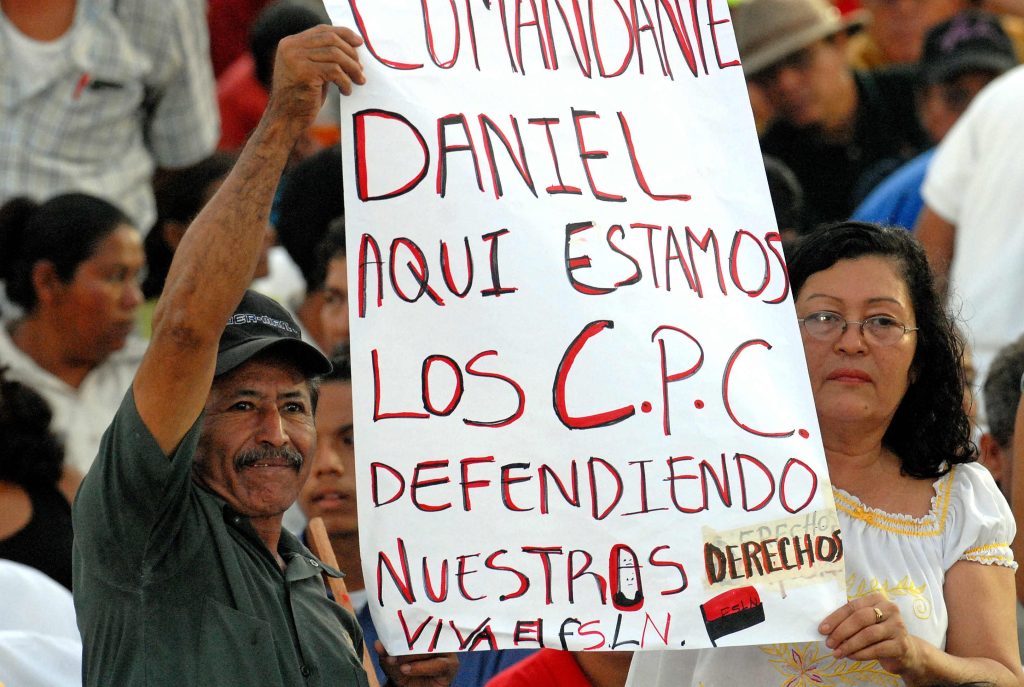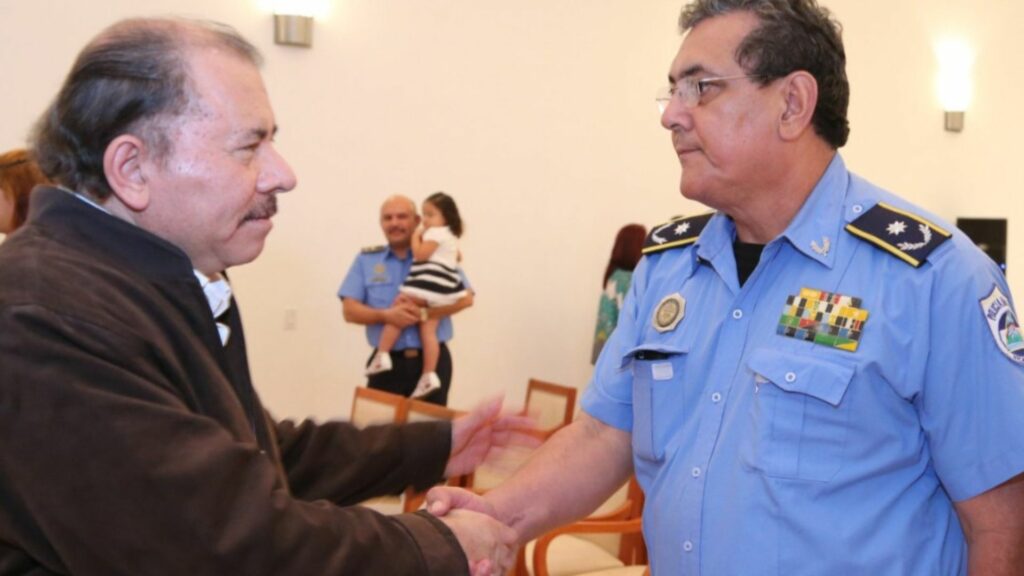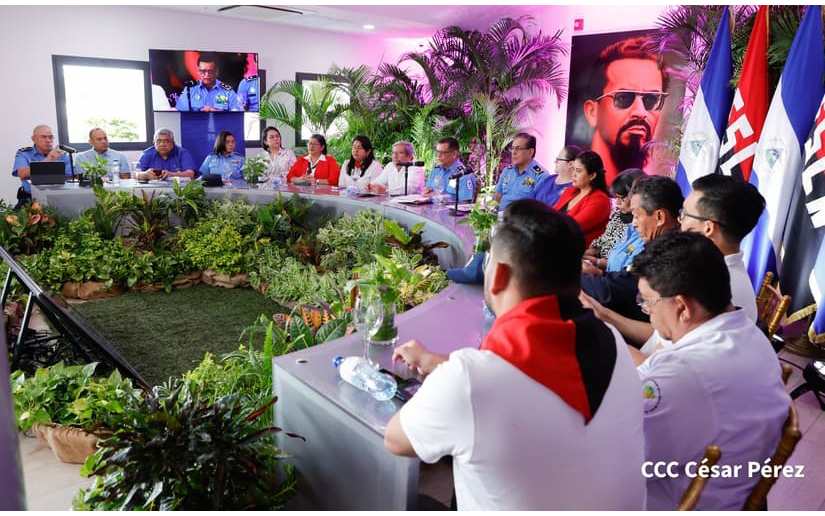On November 7, hours before Daniel Ortega’s last public appearance in which he gave his speech on national television, a meeting of the ruling couple’s closest security circle was held at the Olof Palme Convention Center.
According to Vice President Rosario Murillo, in the meeting they talked about “being alert, communicated, coordinated, as it should be, to defend and safeguard peace”.
Since the beginning of August of this year, the regime announced visits by the Police in the neighborhoods. According to the note published on November 8 on the site of the National Police, these are called “meetings of citizen and human security”.
The police organization said that these meetings are used to “listen to demands and suggestions from the protagonists to improve police performance”.
The police visits, initially understood as house to house, were perceived with suspicion by the opponents, as it was feared that there would be harassment or threats by the officers.

Police-CPC Coordination
The meetings were finally held in a single house, in each neighborhood, where the neighbors were invited by the coordinators of the Council of Citizen Power (CPC), according to what DIVERGENTES was able to confirm.
The initiative is part of the tight control that is the police state imposed by the Ortega-Murillo regime since the end of 2018, when it crushed the rebellion that began in April of that same year.
First, physical demonstrations were banned, and then even virtual spaces were censored through jail and banishment. Currently, in Nicaragua there is no space for the opposition without this meaning arrests, threats, siege and harassment.
The last report of the Office of the United Nations High Commissioner for Human Rights (OHCHR) pointed out that there is “a paralyzing effect on Nicaraguan society”, because “anyone who criticizes the government is punished”.
The Police reported that since August of this year, it has carried out 5098 “citizen and human security” meetings. That is to say, they hold an average of 56 meetings daily throughout the country.
The dictators’ in-law, Francisco Diaz, director of the Police, was the one who presided over the virtual congress last November 7. The meeting was attended by political, municipal and police authorities from the 153 municipalities of the country.
New police model coordination
Rosario Murillo said, last November 7, that in the congress “we talked about all the issues that deeply interest us” such as the “fight against violence in all its forms, children’s rights, to live without violence, to education, to health, because security is to live with everything that guarantees us that we are moving towards the future”, said Murillo.
The dictator’s wife said that “peace allows us to work, progress and prosper”, and announced that the congress conclusions would be published. However, nothing has been published to date.
Meanwhile, the Police reported that with this strategy, the police model “is organized by people, families and communities with the coordination, articulation and communication with the political secretaries and the electoral system to contribute to peace, stability and security”.
The Police Director, Francisco Díaz, said that in the more than 5000 meetings participated merchants, farmers, students, workers and families.
He added that the demands were “greater police presence in the communities, inauguration of police posts in remote areas, the increase of police personnel, not to allow the introduction of colones (Costa Rican currency). On traffic issues it was stated that minors are driving illegal motorcycle races, speeding up the response to complaints, among others”.
Meetings ended with cheers to Daniel Ortega
Through interviews with three citizens present at different meetings in different neighborhoods of Managua, DIVERGENTES learned that the meetings were organized in the house of a member of CPCs in each neighborhood.
The representatives of the Sandinista Front made the invitations to the houses where they knew there was a Sandinista militant. But the meeting was led by police commissioners.
“In the meeting they talked about the problems of the neighborhoods, the lack of street lights, the bikers who were seen in the neighborhood as suspected thieves, but nothing about politics or opponents,” said a citizen who participated in the meeting.
“The commissioner who gave us the talk said that another meeting was going to be held next week, but it has been more than two months and it hasn’t happened… The meeting was packed with police, they filled the whole street, those who were in charge of the meeting shouted ‘long live Daniel Ortega!

Security circle was present
In addition to Diaz, the highest authorities of the National Police were present at the meeting in Managua on November 7.
Commissioner Horacio Rocha, who is now in charge of national security for the Ortega-Murillo family and one of their main political operators, was present.
Rocha has been pointed out as the main executor of the changes in the Supreme Court of Justice (CSJ), in which three magistrates and dozens of workers throughout the country were fired.
At a lower rank, Commissioner Julio Sánchez, co-head of Transit, and Commissioners Vilma Rosa González, of Public Relations, and Zayda Pineda, co-head of Public Security, were present.
As representatives of other institutions, there was Guillermo González, director of the National System for Disaster Prevention, Mitigation and Attention (Sinapred), Amelia Coronel Kinloch, minister of Governance, the institution in charge of the cancelation of more than 3000 NGOs since 2018.
In addition, there was the vice minister of this institution, Luis Cañas, who is the real power in this ministry, where he is in charge of setting up intelligence in the State and canceling passports to opponents.
Also summoned to the meeting were Marta Reyes, Minister of Health; Ramón Landeros, director of the Unified Fire Department; Lucien Guevara, Minister of Youth; Gladys Holmen, Vice Minister of Women; Liliam Herrera, former Minister of Education; Loida Barrera, Minister of the National Technological Institute; Vladimir Gutiérrez, co-director of the Nicaraguan Institute of Territorial Studies; and Iván Lacayo, director of the Nicaraguan Institute of Municipal Development.
In the Police note they informed that next year, 2024, they plan to hold five congresses with the “purpose of listening to the demands of the families and in this way readjust the actions, strategies and security plans to continue being the safest country in Central America”.





